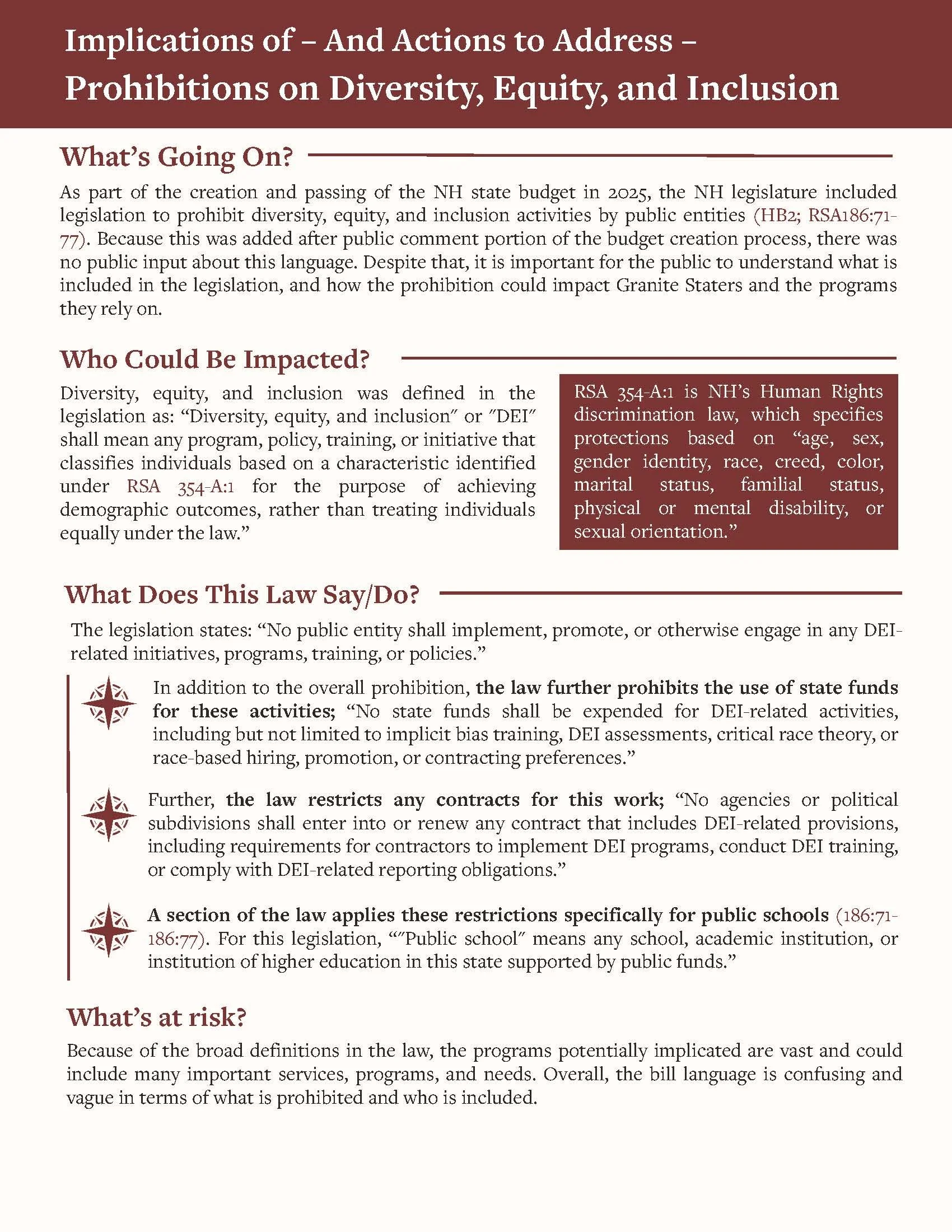Resources
Policy Platform:
“… This Policy Platform further defines the foci for our Public Policy work, providing direction for the issues that we will focus on in our “Inform and Educate” efforts. In addition, making progress on these issues in NH will require work across the other pillars, such as convening stakeholders for difficult discussions (“Community Building and Organizing” pillar) and supporting partners working on these issues (“Institutional Capacity Building” pillar) …”
Reports:
Challenges to Homeownership in New Hampshire
Homeownership is a common hope for many people, but is not always an achievable dream. This has been particularly true for communities of color, including in NH.
To understand the difficulties related to buying a home in the Granite State, this report explores the history of homeownership in the United States, and in NH specifically, including some of the challenges that currently exist.
The Belonging Case for Diversity
The report, titled “The Belonging Case for Diversity”, provides new insights into the multiple ways a focus on diversity in education benefits students and society. The findings of this literature review will serve as a new resource for educators, policymakers, and stakeholders in the education sector, underlining the urgency of advancing DEIJ efforts in public schools in New Hampshire. It can focus efforts to embrace diversity, foster inclusion, and promote justice in order to create a more equitable and enriching educational experience for all students in the Granite State.
Data Briefs:
Race and Ethnicity (2025)
The population profile for New Hampshire is often over-simplified; conversation typically revolves around New Hampshire’s population being predominantly rural, older, and White. While data supports those generalizations, there is value in digging deeper and understanding the more complex story that emerges when looking at a number of factors that describe the almost 1.4 million people who live here. This brief, which focused on race and ethnicity, is the first in a series that reviews some of these characteristics in more detail.
Places of Origin
The population profile for New Hampshire is often over-simplified, with a generalization that NH is a homogenous state. There is value in digging deeper and understanding the more complex story that emerges when describing the more than 1.4 million people who live here. This brief, which focuses on the population of people currently residing in NH and where they come from, is part of a series that reviews some of the state’s characteristics in more detail.
Language
The population profile for New Hampshire is often over-simplified, with a generalization that NH is a homogenous state. There is value in digging deeper and understanding the more complex story that emerges when describing the more than 1.3 million people who live here. This brief, which focuses on languages spoken as reported by the US Census American Community Survey1, is part of a series that reviews some of the state’s characteristics in more detail.
Incarceration
It is well-documented that incarceration rates across the United States are high, with racial and ethnic groups disproportionately represented among incarcerated populations. This brief answers questions about national incarceration trends and reviews the distribution of incarcerated individuals across New Hampshire. However, NH data is limited, which in turn limits what is known about the population involved in NH’s justice system.
Race and Ethnicity
The population profile for New Hampshire is often over-simplified; conversation typically revolves around New Hampshire’s population being predominantly rural, older, and White. While data supports those generalizations, there is value in digging deeper and understanding the more complex story that emerges when looking at a number of factors that describe the almost 1.4 million people who live here. This brief, which focused on race and ethnicity, is the first in a series that reviews some of these characteristics in more detail.
Letters:
Opposition to HB 2 Amendment
NHCJE signed on to a multi-organization letter to express concerns about the DEI prohibition amendment in House Bill 2.
Joint Statement From BLM-NH & NHCJE Regarding the Killing of Nickenley Turenne
One-Pagers:
DEI Prohibition Info-Sheet
This informational bulletin outlines the implications of New Hampshire’s new law (HB2: RSA 186:71-77) prohibiting diversity, equity, and inclusion (DEI) activities by public entities. It explains what the law includes, who could be affected, potential impacts on schools and state programs, and highlights current legal action in response.




















